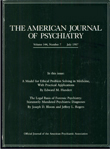Modification of Alcohol Withdrawal by the A9 Allele of the Dopamine Transporter Gene
Abstract
OBJECTIVE: Determinants of individual vulnerability to alcohol withdrawal symptoms are largely unknown. Because of the substantial role of monoaminergic transporters in limiting time and space effects of synaptic neurotransmission, the dopamine transporter gene (DAT1; locus symbol: SLC6A3) was studied as a candidate gene possibly related to symptoms of uncomplicated alcohol withdrawal. METHOD: In 48 chronically intoxicated alcoholics (diagnosed according to ICD-10), withdrawal symptoms were examined and the presence of a variable-number tandem repeat in the 3′ untranslated region of the DAT1 gene was determined. RESULTS: Withdrawal syndromes were more pronounced in the 22 patients carrying the nine-copy repeat than in the 26 patients without this variant. Multiple regression analysis revealed that 4% of the variance of withdrawal was explained by this genotype, whereas 16% was due to the amount of alcohol the patients reported having consumed in the month before detoxification. CONCLUSIONS: The A9 allele of the dopamine transporter gene is associated with more severe effects of alcohol withdrawal, possibly because of modifications of the brain's capacity to compensate for long-term effects of ethanol on cerebral function.



